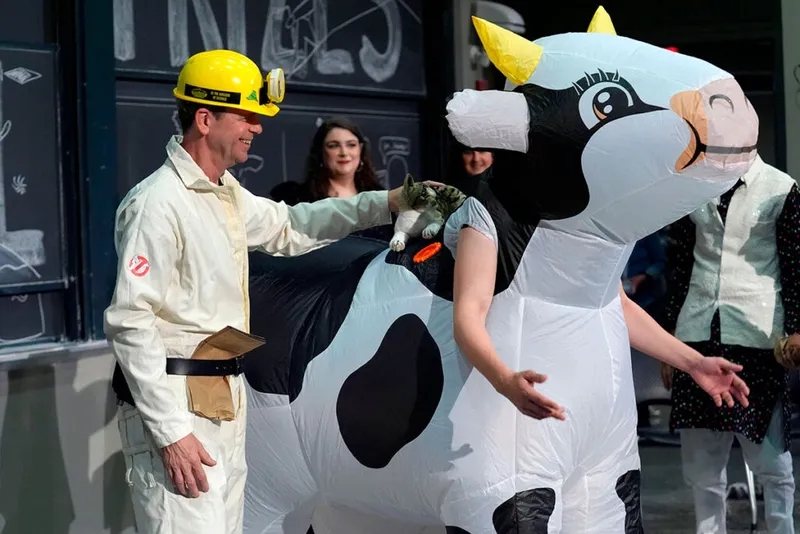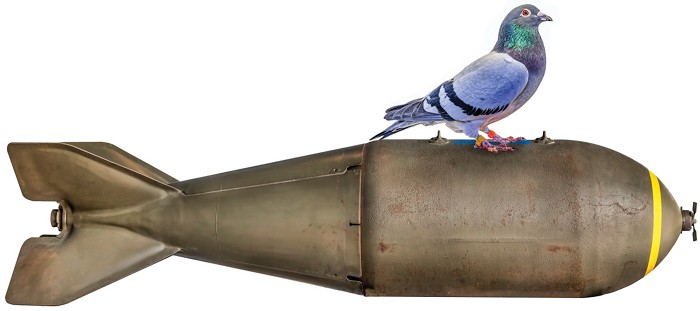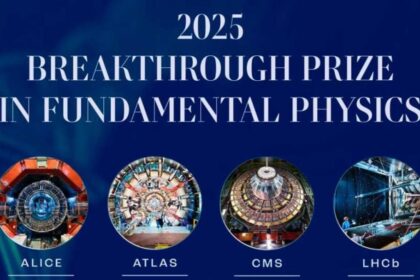Untrained pigeons, drunken worms, mammals that breathe through the anus, these are examples of research topics that won this year’s Ig Nobel Prize.
According to RCO News Agency, The Ig Nobel Prize, which has no affiliation with the Nobel Prize and has only a nominal similarity with it, aims to honor extraordinary research, honor imaginations, and arouse people’s interest in science, medicine, and technology by first making people laugh. And then he thinks about making them.
Every year in the run-up to the Nobel Prizes season, scientists shed their intellectual cloaks for this special event and go for silly research, and this year was no different.
This year’s “Ig Nobel” ceremony was held on September 12 at the Massachusetts Institute of Technology (MIT) with the awarding of prizes by the real winners of the Nobel Prize, and its main theme was “Murphy’s Law”.
The winning research spanned a truly bizarre spectrum. From mimic plants and dead fish that swim to drunken worms and cows that are scared to produce more milk.
Since 1991, this humorous award has been given every year by the scientific humor magazine “Annals of Improbable Research” to 10 researchers who have achieved achievements that first make people laugh and then make them think.
According to the magazine, the Ig Nobel Prizes are intended to celebrate extraordinary research, honor people’s imaginations, and inspire people’s interest in science, medicine, and technology.
Now we are going to introduce this year’s winners.
Chemistry department award Awarded for a curious experiment on “Using Chromatography to Separate Intoxicated and Sober Worms.”
Researchers at the University of Amsterdam used live worms, Tubifex tubifex, as models for the polymers, and isolated worms exposed to ethanol that had slowed down from their more active, alert counterparts.
peace prize Also ironically given to a famous psychologist named BF Skinner, who has died became.
Anatomy Award Awarded for research on “Genetic Determinism and the Effect of Hemisphere on Hair Twist Formation,” which examines whether the hemisphere a person is born into tends to twist (clockwise or counterclockwise) Does one’s hair affect it or not? The researchers found that although most people’s hair curls clockwise, in the Southern Hemisphere it is the other way around and most people’s hair curls counterclockwise.
Botany Award It was also awarded to a team that discovered that some real plants mimic the shapes of neighboring plastic and artificial plants.
Demography Award It was also awarded to research from researchers at the University of Oxford showing that many long-lived celebrities come from areas with poor birth and death records.

James C. Liao, a biologist at the University of Florida, Physics prize Egg won the Nobel for his interesting research on “demonstrating and explaining the swimming abilities of a dead trout”. Liao’s research explains how the natural flexibility of a salmon’s body allows it to generate passive thrust, causing it to swim upward, sometimes even after death.
Bonus statistics and probabilities too It reached a group of 40 researchers, mostly from the Netherlands, who tossed a coin 350,000 times in order to investigate a magician’s hypothesis about the probability of a lion and a line coming up in many tosses. They eventually found that it was more likely that a tossed coin would land on the side it was tossed from.
Physiology Award It was awarded to a team from Cincinnati Children’s Hospital Medical Center for discovering that many mammals can breathe through their anuses.

Finally, Fordyce Ely and William E. Petersen (William E. Petersen) posthumous award biology received an unusual experiment that involved “exploding a paper envelope next to a cat standing on top of a cow” in an attempt to determine how and when cows let out milk, and found that frightened cows produced less milk.
Medicine Department Award It was also awarded to a group of German, Belgian and Swiss researchers who showed in their study that placebos that cause painful side effects are more effective for patients than placebos that do not cause painful side effects.
Ig Nobel Prize
Launched in 1991, the Ig Nobel Prizes are a mockumentary version of the prestigious Nobel Prizes, judging quirky and unconventional research, as well as a reminder that science shouldn’t take itself too seriously.
The Ig Nobel award ceremony also includes short operas, live science shows and 24/7 lectures where researchers have to summarize their work twice, first in 24 seconds and then in just 7 words.
The winners of the Ig Nobel receive a prize equivalent to 100 thousand trillion Zimbabwean dollars, which is one of the least valuable currencies in the world.
It should be noted that, contrary to the seemingly absurd and silly nature of the research presented in IgNobel, they often have real scientific value.
Marc Abrahams, Chief of Ceremonies and Editor-in-Chief of the Ig Nobel Prize-giving magazine, says: “While some politicians try to make sensible things look silly, scientists discover seemingly silly things that make a lot of sense.”
end of message
RCO NEWS


















